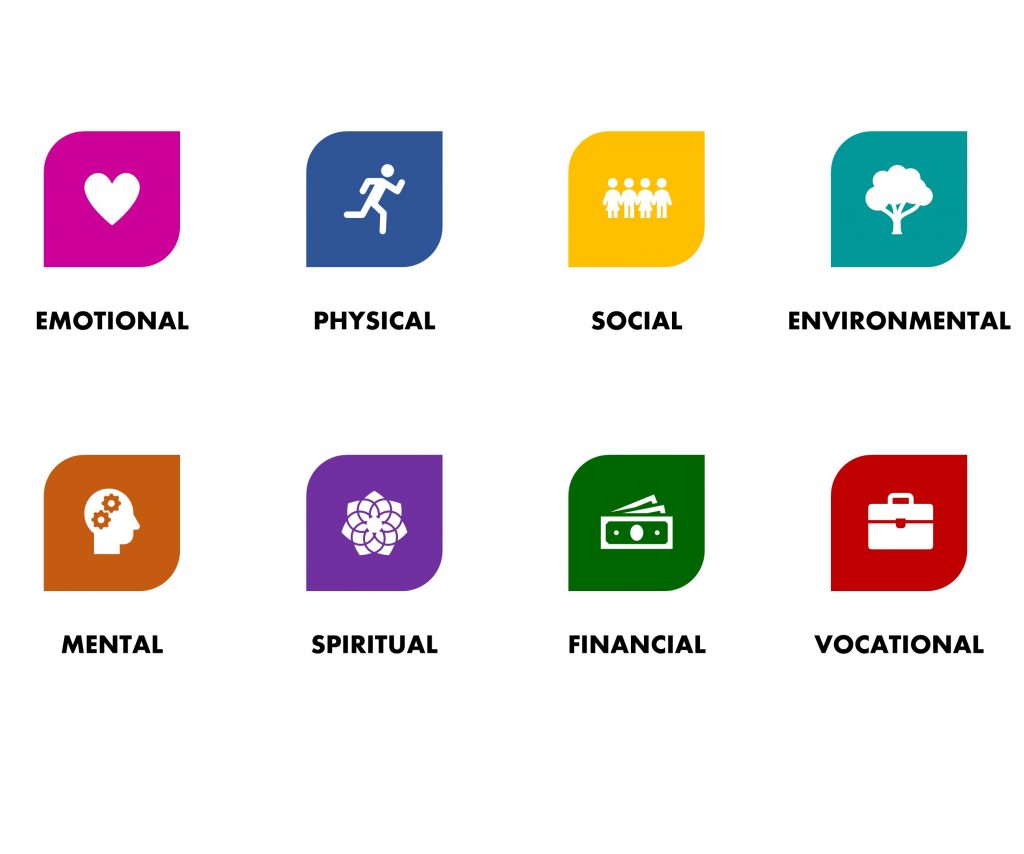Wellness has many important dimensions...
But…You may wonder what wellness has to do with law school?
In fact, taking a careful approach to wellness will not only help you succeed personally and in both college and law school, but is essential to being a successful legal professional.
Law students and lawyers live very busy, and at times, very stressful lives. They are expected to maintain high levels of personal and professional behavior, even in the face of time pressure and stress. Keeping your body in good shape is an essential first step in managing a busy, stressful schedule, but other skill sets need to be included in your wellness routines to help ensure your short and long-term success as a student and professional. Successfully studying law and becoming a legal professional means that you have attend to other forms of wellness as well.
In recent years, efforts have been made to examine the overall well-being of the legal profession. As a result, we now have a much greater understanding of the direct connection between the state of individual wellness to issues within the legal profession. These issues include professional happiness, professional ethics, incidents of malpractice, and personal health. In response, many steps have been taken to help support wellness in the profession, provide resources to practicing attorneys and judges, and to foster a mindset of wellness in working professionals. To demonstrate the commitment to these goals, wellness in now considered an aspect of legal professionalism with many jurisdictions requiring attorneys to regularly complete continuing education training on wellness topics as part of their ongoing obligations for licensure.
In addition, the ABA also found a direct relationship between wellness and successful law students. To help you begin thinking about wellness as part of long-term goals and readiness, we have articulated a few important aspects of wellness for you to consider as you plan for pursuing a legal education.
*Keep in mind the topics below are only a highlight – there are many aspects to wellness and you should investigate them all as you think about your overall well-being and health!
Mental and Emotional Wellbeing
There are many, many aspects to your mental and emotional wellbeing – but one area that is very common amongst high performing individuals is stress management. In terms of study and work, stress can distract focus, decrease efficiency, and increase mistakes. Stress can also harm your judgment in ways that can have negative effects on your professional and personal life. Stress has also been proven to have significant impacts on our physical health if not managed properly. Maintaining your emotional health and preventing the negative effects of stress is extremely important.
Unfortunately, the reality is that pursuing a legal education and law profession will create opportunities of stress and challenge. The good news is, stress can be managed. Knowing you may encounter challenges of this nature provides you an opportunity to be purposeful and proactive in taking steps to develop methods and skills to manage through these times successfully.
There are many strategies you may employ to tackle stress and developing these skill sets now can have benefits throughout your life. It is important to make sure you are developing healthy stress management techniques and avoiding relying on sources of outlet that might provide temporary relief, but can create long-term damaging habits (such as substance abuse). As you begin developing healthy management skills you may need to try different tactics and approaches to learn what works best for you. Some individuals mange stress through relaxation, mindfulness, meditation, socialization, spiritual practice, and simple exercise. Some seek a more structured approach through therapy and counseling to cope.
Whatever healthy approach to stress management works for you is right. What is important is that you identify how stress impacts you and what methods create relief. Some aspects of stress management to consider include:
-
-
- Mindfulness. Mindfulness is a particularly useful skill to develop. Mindfulness allows you to maintain relative emotional calm, even in stressful situations, and helps you sharpen mental focus. Techniques for enhancing mindfulness are simple and can be practiced every day.
- Relaxation & Exercise. Appropriate forms of relaxation can refresh your mind, and renew the energy and focus you bring to your tasks. If you build a reasonable amount of relaxation into your busy schedule you will benefit with better results in your work. Relaxation can take many forms, from reading, to watching TV, to enjoyable hobbies and socializing. Exercise has long been proven to provide an outlet for managing overall health – including stress. Explore and discover health exercise activities that work for you.
- Spiritual practice. Spirituality can take many forms and does not necessarily refer to an organized religion (although it may for you). If spirituality or religious faith is part of your life, attending to it can help you manage stress. In the busy life of being a law student or legal professional it is important not to lose touch with the spiritual part of yourself. Caring for your spirituality will provide you with many benefits.
- Positive Thinking and Positive Self-regard. Having a positive outlook is important and has been tied to overall health benefits, but you also need to be kind to yourself. Everyone makes mistakes, or fails from time to time. Learn to forgive yourself for your perceived failures, be mindful of setting positive and realistic goals, and work to silence any negative self-thoughts. We all need a pick-me-up sometimes, in a pinch – consider an emergency compliment to lift up your day!
Below are some additional resources to help you begin thinking through stress management techniques:
Find what works for you! There are also tremendous online resources and apps to help with daily mindfulness, relaxation and stress – consider trying out a few and adding theses practices into daily life. Consider trying this online breathing exercise from CALM as a start!
Time management
 Time management is an obvious companion to stress management and a key part of wellness. It is also an incredible tool that can be an invaluable asset to helping you achieve goals in all aspects of your life!
Time management is an obvious companion to stress management and a key part of wellness. It is also an incredible tool that can be an invaluable asset to helping you achieve goals in all aspects of your life!
Although you have been busy as a college student, law school will provide new challenges for managing your time. Law students are under incredible time pressure, and professional attorneys tend to be under such pressure as well. Building time management skills now will help you rise to the challenges of law school and professional obligations and provide the structure necessary to tend to all aspects of your life whether it be academic, personal, or professional.
It is a good idea to build a systematic time management scheme that is suited to your life and your personality. There are many time management systems out there, but they all build on a few basic concepts or skills. Here some things to consider when building time management skills:
Organization and Planning. A key to effective time management is staying organized. A good time management system will allow you to manage and schedule important tasks, activities, and information in your life so that it is easy to manage and execute. It is important that you think of time management at different levels including daily, monthly, by semester, and yearly. As you consider your system – keep in mind the following:
-
-
-
- Deadlines. It is essential that your time management system allow you to keep abreast of the deadlines and obligations in your life, both the upcoming ones and those further in the future. Don’t forget to plan for the unexpected – consider giving yourself internal /pre deadlines a few days or a week before critical/final deadlines.
- Format. Because a time management system is essentially an information management system, the format will be important. Many people manage their time using online calendars, apps, or other tools, but paper-based time management tools are also popular. Whichever format you choose, it must work in a way that feels natural to you and be readily available throughout your day/week/month.
Tracking/Accountability. A good time management system will allow you to both see what is coming up in your life, but also what you have done in the past. It is also important to find systems to hold yourself accountable to the schedule and goals that you set, being realistic and making adjustment when you miss a goal.
-
-
-
- Assess Your Time Needs: Sometimes we don’t truly understand how long tasks actual take us to complete (especially in a distraction free setting). Spend a week actively tracking the time it takes you to prepare for class, read assignments, commute, make dinner, grocery shop, etc. Once you have specific understand of your time needs, you can make a good plan!
- Be Realistic! One of the easiest ways to become discourage with your time-management efforts is to be overly ambitious and unrealistic. Set yourself up for success by planning more time than you think necessary for tasks such as homework, papers, class projects, or academic prep. Plan for the unexpected by building in time to your schedule for things you do not anticipate, emergencies, or delays.
Personalization. Finding a time management system that works seamlessly for you is essential. There are many, many time management systems available, but the one you choose should work for you, including being easy to modify to suit your particular needs.
Learn More about Time Management…
Financial Wellness
 You may not normally think of your finances as a wellness issue, however, developing an understanding of your personal financing and obligations is essential for long-term success and opportunity. This may include taking steps to fully understand your current financial situation, having a reasonable personal spending plan or budget, appropriate saving habits, and planning for the future. Law school is expensive and most students will incur some level of debt to manage these expenses. Developing your financial wellness skill set and knowledge will assist you in preparing to assess your financial obligations as they relate to your legal education, increase your eligibility for assistance options (law school loans), and set your long-term career goals.
You may not normally think of your finances as a wellness issue, however, developing an understanding of your personal financing and obligations is essential for long-term success and opportunity. This may include taking steps to fully understand your current financial situation, having a reasonable personal spending plan or budget, appropriate saving habits, and planning for the future. Law school is expensive and most students will incur some level of debt to manage these expenses. Developing your financial wellness skill set and knowledge will assist you in preparing to assess your financial obligations as they relate to your legal education, increase your eligibility for assistance options (law school loans), and set your long-term career goals.
Below are important skill sets you can begin developing now as an undergraduate student!
Develop Good Financial Habits. Being a good steward of your financial health and credit history will be invaluable to ensure the widest possible opportunities to you as a law student and law graduate. Below are some simple steps to begin fostering your financial wellness.
-
-
- Learn to Budget. Creating a workable spending plan, or budget, helps you understand the relationship between your expenses, income, and overall needs. Developing budgeting skills should be important for anyone considering law school, regardless of your current financial circumstances. This process will help you think long-term about goals as a professional (salary) and long-term debt prospects associated with educational loans. This skill will also be critical as you enter law school as you may be require to create individual projected budgets for determining loans, financial aid, and grants. Consider budgets in terms of monthly and yearly needs and goals.
- Develop and Manage Credit. Having good credit is an important priority. Take small steps now to avoid any unnecessary challenges in this area. Invest in mastering the following simple steps:
-
- Create a bill payment system/tracking process to ensure payments are never missed.
- Make all payments on-time.
- Avoid “bad” debt wherever possible (credit cards) and be mindful of interest rates!
- If you have debt (credit cards, car loans, etc) make meaningful efforts to bring balances to zero prior to law school.
- Saving. As a student the idea of saving may seem impossible. However, building a saving habit, even of a very small amount, on a regular basis will have immense benefits down the road. Consider starting a small emergency fund or general savings to help offset unexpected costs and expenses and reduce potential stress down the road.
- Having an understanding of your finances and necessary skills to manage, will allow you to reach for the things you want in life and set you up for a successful financial future. Below are some additional resources to explore as you tend to your financial wellness.
Final Thoughts
 One thing that can be a tremendous benefit no mater what aspect of wellness you are exploring is your relationships with others – whether friends and family; your professors, advisors, and campus leaders; or connections you make professionally – healthy and fulfilling relationship can serve as a fantastic source of support and benefit to you.
One thing that can be a tremendous benefit no mater what aspect of wellness you are exploring is your relationships with others – whether friends and family; your professors, advisors, and campus leaders; or connections you make professionally – healthy and fulfilling relationship can serve as a fantastic source of support and benefit to you.
Interpersonal skills are also an essential tool for practicing attorneys. Creating and maintaining positive relationships will serve as the building blocks for your future professional relationships as well. Keep in mind that good relationship building can often come down to the simplest steps remembering that professional and work relationships benefit from the golden rule: Treat others as you would wish to be treated. Respect, courtesy, civility, and consideration for others are not just formalities. They are important to your success.
As a law student or legal professional you will be leading a complicated, busy life. Maintaining wellness, in all forms, is essential to being successful. By caring for yourself in these ways you make it possible to achieve what you want in life, and also to make the best contribution to you can to society and the lives of others.
 Judge Kern is a Federal Administrative Judge with the U.S. Merit Systems Protection Board. The Merit Systems Protection Board examines important issues related to the federal workforce. The Board is an independent, quasi-judicial agency in the Executive branch that serves as the guardian of Federal merit systems. The mission of the MSPB is to “Protect the Merit System Principles and promote an effective Federal workforce free of Prohibited Personnel Practices.”
Judge Kern is a Federal Administrative Judge with the U.S. Merit Systems Protection Board. The Merit Systems Protection Board examines important issues related to the federal workforce. The Board is an independent, quasi-judicial agency in the Executive branch that serves as the guardian of Federal merit systems. The mission of the MSPB is to “Protect the Merit System Principles and promote an effective Federal workforce free of Prohibited Personnel Practices.” 












